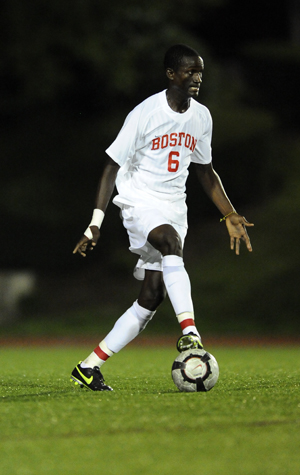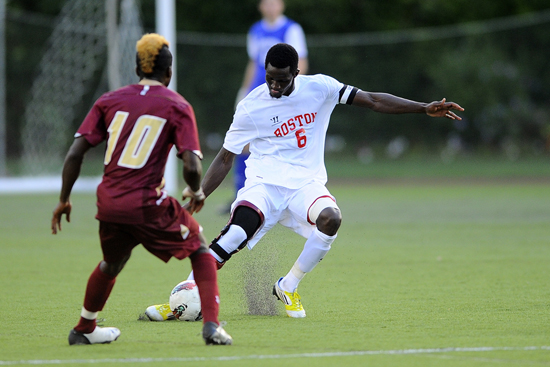Sweeper as Show-Runner
Kelvin Madzongwe (COM’15) found his voice, on the field

If you meet Kelvin Madzongwe any place other than a soccer field, you might have a hard time recognizing him out on the pitch. Off field, the 23-year-old is mild-mannered, impeccably polite, and full of fun. When the game clock starts, he becomes 170 pounds of extremely vocal intensity. “As soon as he steps on the field,” says goalkeeper Nick Thomson (SAR’15), “it’s like a different person. He’s always commanding and talking, and he demands so much of his teammates.”
That loquacity isn’t just spirited prattle—it’s an all-important guidance system for the entire BU men’s team. As the Terriers’ sweeper, Madzongwe (COM’15) is a kind of on-field director, watching the play and telling the midfielders whom to mark. “What Kelvin does is provide composure and security for all the guys,” says Thomson. “He instructs the midfielders and makes sure the back four is working as a unit. He really covers for everyone.”
Being a varsity team show-runner might seem like a strange calling for someone who grew up in the small community of Magwegwe, Zimbabwe, but Madzongwe’s leadership skills have been building for a long time. He started playing soccer with neighborhood boys at the age of 10, played for his middle school team, and was eventually recruited to play for Mpopoma High School in the nearby city of Bulawayo. At 17, he joined the FC Sparrows professional club team and the U-20 national team during the offseason.
In 2010, when Zimbabwe was in the throes of an economic crisis and many of Madzongwe’s friends were leaving the country to find work, he was contacted by men’s soccer head coach Neil Roberts, who heard of Kelvin’s skills from former Terrier player Mike Emenalo (CAS’89). Emenalo was working as a scout for Chelsea FC in the English Premier League and had heard one of Madzongwe’s coaches speak highly of the young man’s play. Madzongwe had also been approached by coaches at St. John’s University and American University, but accepted Roberts’ offer of an athletic scholarship.
“It didn’t really hit me until I started looking through the papers,” he recalls. “Once I started to realize that it was really happening, I was so excited and so grateful for the opportunity. It was one of the few times that almost brought a tear to my eyes.”
In August 2010, Roberts picked Madzongwe up at the airport and brought him to campus. The skinny freshman was awed by the campus and the athletic facilities, but when he entered the locker room for the first time, the familiar scene helped him realize that the transition would not be too difficult.
Cocaptain Anthony Ciccone (SAR’14) says that the team’s upperclassmen made Madzongwe feel comfortable right away. “That’s the best aspect of being part of a team,” Ciccone says. “Making friends and interacting with people is easy, and we all have something in common.”
It didn’t take long for Madzongwe to find his voice with the team. “At first it was tough because of the new language and environment, but on the soccer field it’s different,” he says. “We all speak the same language, and that’s soccer. We all have a passion for one thing and that’s the game. On the field, it’s like everything comes naturally, and you know what to say.”
Roberts remembers watching Madzongwe settle into his new role. “There were so many things going on when he first got here,” he says. “Kelvin may have been a little overwhelmed, but when he gets onto the soccer field, that’s easy, that’s natural for him, and that’s when his true personality comes out.”
As a freshman, Madzongwe started all 17 games and was named America East Rookie of the Year, and the following year he was voted America East Defender of the Year. It was a very impressive performance, and it came to an end in the third game of the 2012 season, when he heard a loud pop in his knee. His anterior cruciate ligament had torn. One week later, he had reconstructive surgery and struggled to come to terms with his new position on the sidelines.
“The first two months were rough,” he recalls. “But I got over the injury as time went on and become more involved with the team.”

The Terriers also had a difficult time coping with Madzongwe’s absence. He had been part of a three-man back line that had shut down number 11 Boston College earlier that season, but without him, Roberts felt he had no choice but to put a fourth defender on the field.
Sanford Spivey (SMG’15) filled in as defensive captain for the remainder of the season. Spivey says he had learned a lot from Madzongwe during the previous season, and that helped him step into the role.
“There was one game my freshman year where Kelvin consistently told me to always cover behind him when he went to attack the ball,” Spivey says. “Right after he said that, a play unraveled that led to a breakaway, but since I had listened to his advice, I ended up making a goal line save for the team. Even though I looked like the hero on that particular play, Kelvin’s advice and communication really saved us.”
The Terriers fought their way to a 6-8-2 record in their final season in America East, and failed to earn an at-large bid to the NCAA tournament.
“Not having Kelvin there was a big loss,” says Thomson. “Not taking credit away from the guys out there who gave it their all, but we are definitely stronger with him on the field.”
Now, in his team’s inaugural season in the Patriot League, Madzongwe is fully recovered and fully psyched. He played 99 minutes in the Terriers home opener against Boston College on August 30, a 2-1 overtime loss.
“He’s always been one of our hardest working players, and the work he put in to get back was just phenomenal,” says Roberts. “That’s the way he is in the classroom, and that’s the way he is on the field.”
Nate Weitzer can be reached at nweitzer@bu.edu.
Comments & Discussion
Boston University moderates comments to facilitate an informed, substantive, civil conversation. Abusive, profane, self-promotional, misleading, incoherent or off-topic comments will be rejected. Moderators are staffed during regular business hours (EST) and can only accept comments written in English. Statistics or facts must include a citation or a link to the citation.